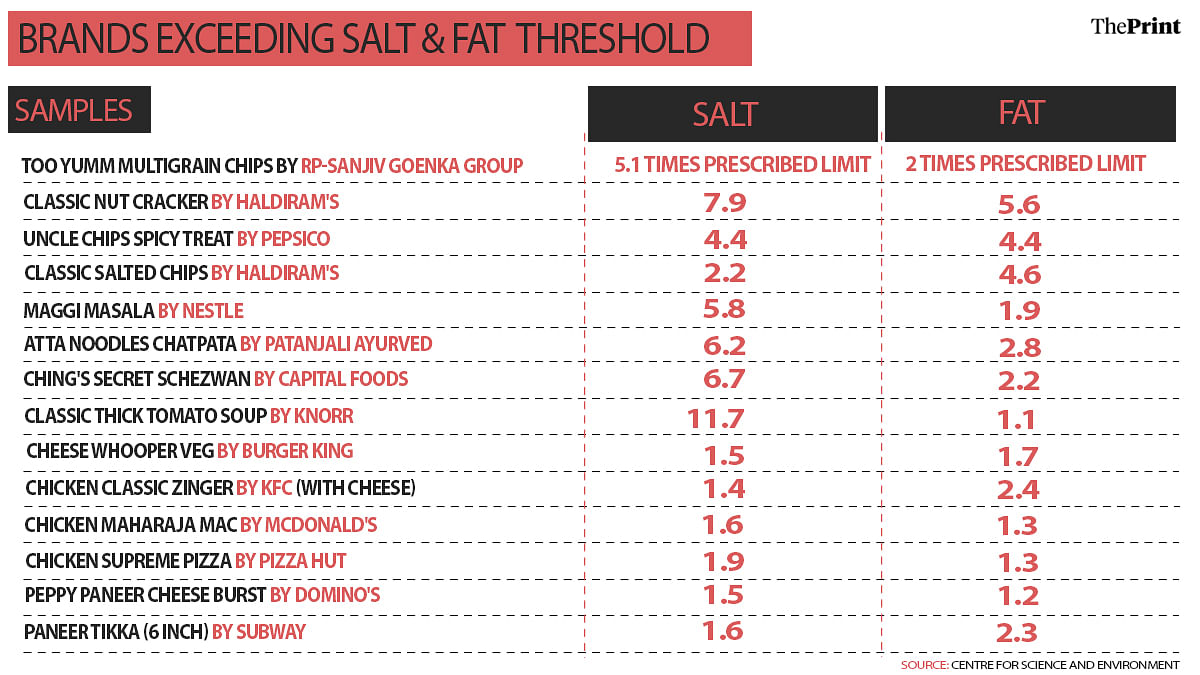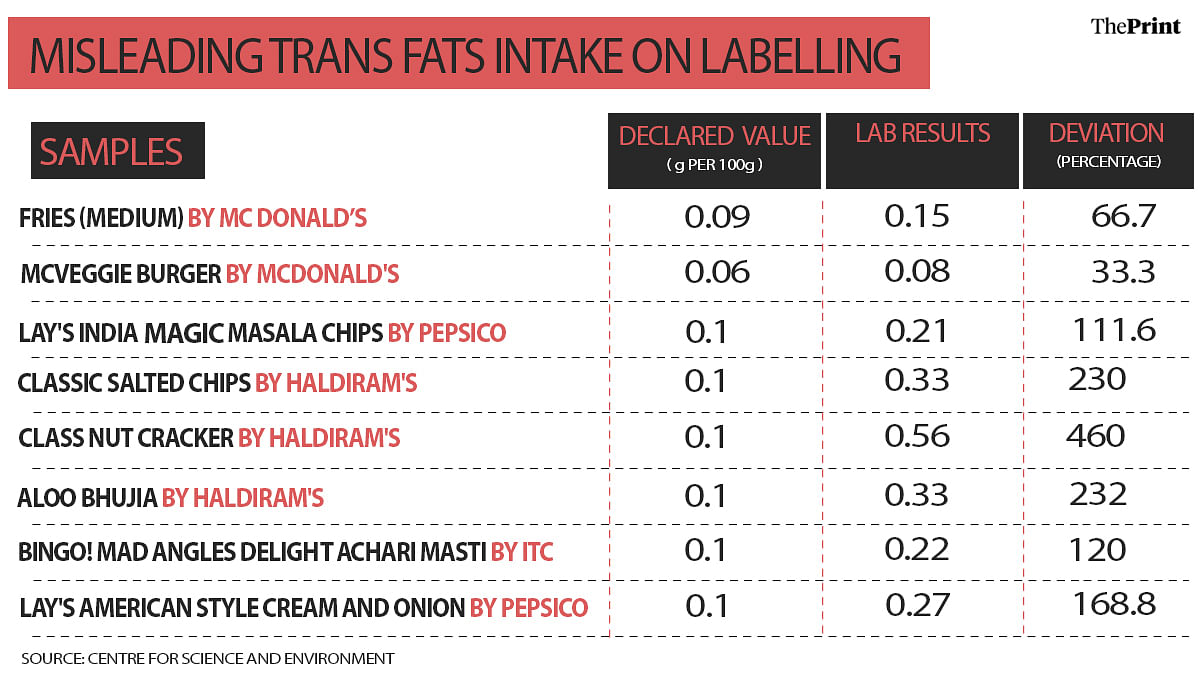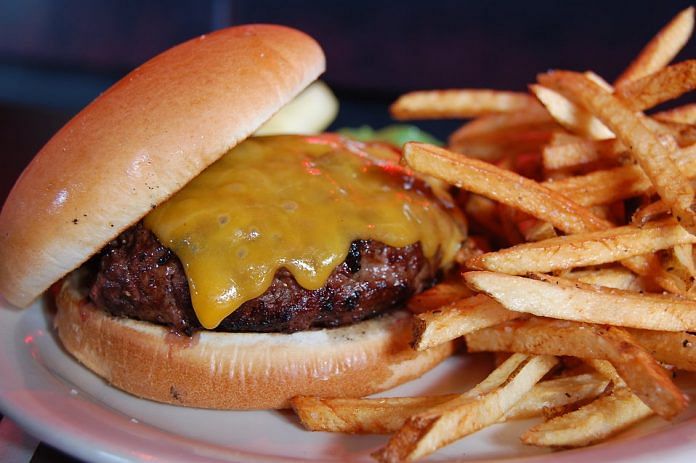New Delhi: Packaged and fast foods sold by top food companies contain “dangerously” high levels of salt and fat, claims a new study by the Centre for Science and Environment (CSE), the Delhi-based research and advocacy think-tank.
Released Tuesday, the study alleges that the popular snacking brands such as PepsiCo, Domino’s, ITC, Patanjali, Hindustan Unilever, Nestle, McDonald’s, Subway and Burger King sell products with salt and fat contents much higher than the threshold set by the country’s food regulator, the Food Safety and Standards Authority of India (FSSAI).
The thresholds are in the draft of the Food Safety Standards (labelling and display) Regulations, 2019, but are yet to be notified.
The industry has been opposing the regulator’s move mandating a “red-coloured label” on food packets containing high salt and fat content.
The study has also accused the industry of misleading consumers by downplaying the exact amount of trans fats in their products. It found that in some samples, the actual fats levels were 50 times than that declared on the food packets.
According to the American Heart Association, eating trans fats increases the risk of developing heart disease and stroke. It is also associated with a higher risk of developing type 2 diabetes.
Several studies have also shown that high intake of salt (sodium chloride) is associated with high blood pressure which in turn, raises the risk for heart disease, stroke, kidney failure, and other health problems.
Also read: Keeping cholesterol levels low before 45 helps reduce risk of heart diseases later: Study
High salt, high fat in top brands: Study
The study surveyed 33 food items, which includes 14 samples of packaged food such as chips, instant noodles and soup among others and 19 samples of fast food such as burgers, fries, sandwiches and pizzas.
The lab results, according to the study, showed that the chips category contained severely high levels of sodium (salt) and fat (see box).
For instance: Brand Uncle Chips by PepsiCo contained 4.4 times the threshold of salt and fat. According to FSSAI’s benchmark, sodium limit is 0.25mg in 100 grams of serving whereas the total fat, which includes trans fat, is 8g.
Similarly, Haldiram’s Nut Cracker was found to contain salt 7.9 times the threshold and while the fat content exceeded the permissible limit by 5.6 times.
In the noodles category, Nestle’s Maggi contained salt 5.8 times more than the limit while Atta Noodles by Patanjali had salt 6.2 times the FSSAI threshold.
In the junk food category, the sample of Chicken Seekh Kebab by Subway contained salt twice the permissible limit whereas fat content exceeded the threshold by 1.7 times. Similar numbers were noted for products of McDonald’s, Domino’s and Pizza Hut.

Misleading labels
Several packaged food items were found to have much higher trans fats than the declared values on the packets, the study claimed.
For instance: Brand Lay’s Magic Masala by PepsiCo contained 0.21 gram of trans fats per 100 gram. However, the packet labelled 0.1 gram of trans fat, the study said.
According to the study, the highest deviations in labelling and actual values were found in Haldiram’s Salted Chips, Nut Cracker and Aloo Bhujia (see table).

In the junk food category, McDonald’s samples were found with massive deviations. For instance, the company’s fries contained 0.15 gram of trans fat per 100 gram of serving (when checked by CSE labs) whereas the company has declared 0.09 gram.
Also read: Year after HC order, Modi govt to act against e-pharmacies selling drugs without licences




So why is the govt not taking action if seems u all are helpless for instance hsldirams channa chor sodium content showing per 100 gm sodium is 320 mg some one needs t give answer
The study is good. But unfortunately people will not buy from the organisations which do not supply excess salt and transfat. The above companies will be out of the market in no time.
Let the ruling and opposition government should take a note of the findings and if they have any remote respect for their fellow men they should act immediately to ensure the safety of the food that people are eating… Anyone
born to to a mother and a father and son of India should… must act immediately irrespective of political colours to protect our gullible innocent Indians
This is much ado about killjoy goodness. People eat junk food when they need to eat junk.
Secondly, the adequate salt levels are some thing like 0.5 gm of salt per day for adults’ body mass. Due to an illness, I was prescribed this salt level. I solemnly declare, this level of salt is non-edible.
Do the food-safety warriers know the level of fat and salt in every day cooking? It exceeds the dictates of the holier than thou lot. So we should give up eating every-day food?
The Print has many worthy topics to write about than this junk.
Excellent topic to cover. Food scientists discovered a while ago that high concentrations of added sugar, fats, and salt spike dopamine levels in the brain and result in an addiction like quality to foods. Couple this with the fact that highly processed foods have less micro-nutrient content (vitamins and minerals) ie empty calories and over can begin to understand why processed foods are bad for health. Satiety is linked to quality food ie balanced macro and micro nutrients. Low quality energy dense food doesn’t trigger satiety levels and hence we consume more junk food than we otherwise would. This kind of food should not be labelled food. It literally makes one ill because over time metabolizing empty calories leads to a generalized inflammatory response which if the hallmark of Metabolic Syndrome (MeS).